#educational standards
Text
Worried by Florida’s history standards? Check out its new dictionary!
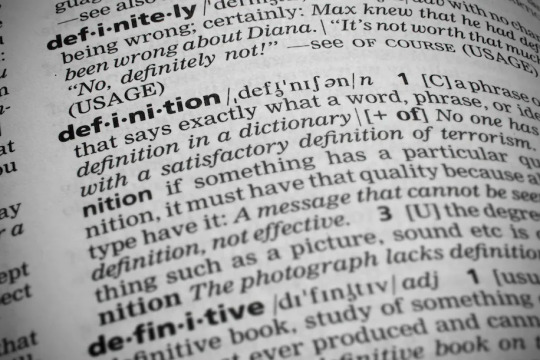
As always, Alexandra Petri is spot on in satirizing the right-wing censorship and educational nonsense happening in Florida. This is a gift 🎁 link, so you can read the entire column, even if you don't subscribe to The Washington Post.
Below are some excerpts 😂:
Well, it’s a week with a Thursday in it, and Florida is, once again, revising its educational standards in alarming ways. Not content with removing books from shelves, or demanding that the College Board water down its AP African American studies curriculum, the state’s newest history standards include lessons suggesting that enslaved people “developed skills” for “personal benefit.” This trend appears likely to continue. What follows is a preview of the latest edition of the dictionary to be approved in Florida.
Aah: (exclamation) Normal thing to say when you enter the water at the beach, which is over 100 degrees.
Abolitionists: (noun) Some people in the 19th century who were inexplicably upset about a wonderful free surprise job training program. Today they want to end prisons for equally unclear reasons.
Abortion: (noun) Something that male state legislators (the foremost experts on this subject) believe no one ever wants under any circumstances, probably; decision that people beg the state to make for them and about which doctors beg for as little involvement as possible.
American history: (noun) A branch of learning that concerns a ceaseless parade of triumphs and contains nothing to feel bad about.
Barbie: (noun) Feminist demon enemy of the state.
Biden, Joe: (figure) Illegitimate president.
Black history: (entry not found)
Blacksmith: (noun) A great job and one that enslaved people might have had. Example sentence from Florida Gov. Ron DeSantis (R): “They’re probably going to show that some of the folks that eventually parlayed, you know, being a blacksmith into doing things later in life.”
Book ban: (noun) Effective way of making sure people never have certain sorts of ideas.
Censorship: (noun) When other people get mad about something you’ve said. Not to be confused with when you remove books from libraries or the state tells colleges what can and can’t be said in classrooms (both fine).
Child: (noun) Useful laborer with tiny hands; alternatively, someone whose reading cannot be censored enough.
[...]
[See more select "definitions" below the cut]
Classified: (adjective) The government’s way of saying a paper is especially interesting and you ought to have it in your house.
Climate change: (noun) Conspiracy by scientists to change all the thermometers, fill the air with smoke and then blame us.
[...]
Constitution: (noun) A document that can be interpreted only by Trump-appointed and/or Federalist Society judges. If the Constitution appears to prohibit something that you want to do, take the judge on a boat and try again.
[...]
DeSantis, Ron: (figure) Governor who represents the ideal human being. Pronunciation varies.
Disney: (noun) A corporation, but not the good kind.
[...]
Election: (noun) Binding if Republicans win; otherwise, needs help from election officials who will figure out where the fraud was that prevented the election from reflecting the will of the people (that Republicans win).
[...]
Emancipation Proclamation: (noun) Classic example of government overreach.
Firearm: (noun) Wonderful, beautiful object that every person ought to have six of, except Hunter Biden.
[...]
FOX: News.
Free speech: (noun) When you shut up and I talk.
Gun violence: (noun) Simple, unalterable fact of life, like death but unlike taxes.
[...]
Jan. 6: (noun) A day when some beautiful, beloved people took a nice, uneventful tour of the U.S. Capitol.
King Jr., Martin Luther: (figure) A man who, as far as we can discern, uttered only one famous quotation ever and it was about how actually anytime you tried to suggest that people were being treated differently based on skin color you were the real racist. Sample sentence: “Dr. King would be enraged at the existence of Black History Month.”
Liberty: (noun) My freedom to choose what you can read (see Moms for Liberty).
Moms for Liberty: (noun) Censors, but the good kind.
[...]
Pregnant (adjective): The state of being a vessel containing a Future Citizen; do not say “pregnant person”; no one who is a real person can get pregnant.
Queer: (entry not found)
Refugee: (noun) Someone who should have stayed put and waited for help to come.
Slavery: (noun) We didn’t invent it, or it wasn’t that bad, or it was a free job training program.
Supreme Court: (noun) Wonderful group of mostly men without whom no journey by private plane or yacht is complete.
Trans: (entry not found)
United States: (noun) Perfect place, no notes.
[emphasis added to defined words]
#florida#ron desantis#black history#educational standards#alexandra petri#satire#the washington post#gift link
150 notes
·
View notes
Text
Declining Math Skills in Canadian Students: A PISA Study
The most recent Programme for International Student Assessment (PISA) results have shown a significant decline in Canadian children’s math abilities. This decline, measured from 2003 to 2022, shows only 12% of Canadian students reaching high proficiency levels in math, a stark contrast to higher percentages in Asian regions like Singapore and Hong Kong.
The PISA Examination
Administered…

View On WordPress
#Academic Performance#Canada Math Education#Educational Standards#Global Ranking#Math Proficiency#OECD Education#PISA 2022#Student Assessment#Teaching Methods
0 notes
Text
“We’re trained to be like, ‘If I’m not exceptional, I won’t be loved.’ Certainly, I think that was my thing,” Gatwa shared. “So, yeah, I think I’m just learning now like, ‘Oh, you are allowed to be loved.’ You don’t have to be excellent or aspire to that term, ‘Black excellence’. What the hell?”
He continued, “There’s so much white mediocrity that gets celebrated, and Black people, we have to be absolutely flawless to get half of [that] anyway. So, I’m slowly training myself out of that and being like, ‘No shit. You deserve love just for existing.’ And that has taught me to be a lot more loving as well, in a weird way.”
No lies detected
edit - adding link to original article here.
#ncuti gatwa#fifteenth doctor#doctor who#sex education#barbie movie#white mediocrity#white hollywood#black hollywood#black actors#black Scottish actors#Rwandan-Scottish actor#i love ncuti#criticism of hollywood#casting of hollywood#queer actors#queer black actors#double standards
870 notes
·
View notes
Text








JackLeela you have to stop. Your love too true. Your yearning too different. Your romance too fated. They'll kill you
#cursed princess club#/copypasta#THEYRE SOD DLJDKSKS THEY RE SO IN LOVE GAAAAH#if leelathae watched over the pastel siblings their standard of romance would be off the charts#no fairy tale romance can match jackleela#like literally fairy tales is a literal biography to them#Jack Is Many things but you cant deny that hes genuinely sincere when it comes to things and people he cares about#also hes literally very educated despite not being socially smart#hes so unjudgemental
154 notes
·
View notes
Text
I feel like anyone who's about to embark on attempting to type out a character's accent phoentically (at least as well as one can with English) should probably stop for a moment before they get going and ask themselves, "How would I, myself, feel about a fic where the one character who sounds like me had their speech written out like this and every other character just got their dialogue left in standard spelling?" I feel like a lot of people would tone it down a bit, at least, if they'd done that thought experiment first.
(Anyone who answered "but I don't have an accent!" isn't allowed to write out anyone else's accent, ever. This rule may seem harsh but you need it. Really, you do. Because you've never had anyone treat your accent as abnormal or comical or wrong, so you really don't know what you're inflicting on others here.)
#writing stuff#have you read that fic where the socially prestige accent is the one being carefully typed out “like it sounds”? no? neither have i :(#the obvious note-for-Americans on typing out UK accents is that most of them carry some connotation of class and/or 'education'#within the uk: ask yourself why a Geordie gets typed out but not some dude from the Home Counties#typing out an accent is - usually - a roundabout way of saying “this person talks WRONG! they're not NORMAL!”#you may also find 'Scottish Twitter' informative for the distinction between in-group and out-group 'transcriptions' of accent/dialect#(i use that example only cos I'm Scottish btw)#(oh yes EVERYONE thinks I have an accent! and many of them attempt to replicate it badly in text!)#fun story: one time i had to learn the [IPA] for a linguistics class and the examples were 'standard' English pronunciations#and I went in the next day BAFFLED by why the book insisted that 'boot' and 'foot' don't contain the same vowel sound#(cos they fuckin do don't they?!)#the tutor explained and was v interested in the fact that to me they're the same. i was then asked to demonstrate again for the class.#but i - alas - was not offered repeated examples of however the fuck people say boot and foot in RP :(#(this was IN SCOTLAND btw)#anyway mibbe jist dinnae dae it? mibbe?#and if you do you have use the actual IPA. there now i've made it more trouble than it's worth for most people.
267 notes
·
View notes
Text
If I see one more "reducing butch and femme to heteronormative roles is gross" when there's literally nothing heteronormative about it, I'll fucking explode
#random stuff#I'm so tired of people purposefully not getting it. avoiding any sort of education on it and calling it heteronormative#stop trying to standardize lesbianism to your own views. fuck
341 notes
·
View notes
Text
The Supreme Court is trying to drag America backwards to “Separate but Equal”

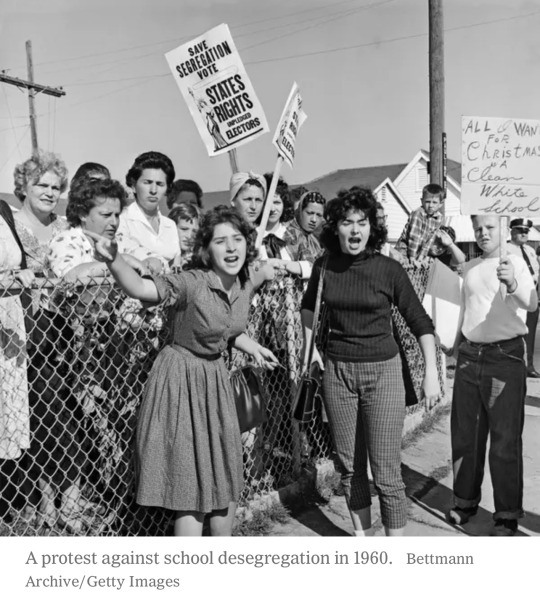
President Andrew Johnson vetoed the nation’s inaugural Civil Rights legislation because, in his view, it discriminated against white people and privileged Black people. The Civil Rights Act of 1866 (which Congress enacted over the veto) bestowed citizenship upon all persons — except for certain American Indians — born in the United States and endowed all persons with the same rights as white people in terms of issuing contracts, owning property, suing or being sued or serving as witnesses. This law was proposed because the Supreme Court had ruled in Dred Scott v. Sanford that African Americans, free or enslaved, were ineligible as a matter of race for federal citizenship, and because many states had barred African Americans from enjoying even the most rudimentary civil rights.
Johnson vetoed the act in part because the citizenship provision would immediately make citizens of native-born Black people while European-born immigrants had to wait several years to qualify for citizenship via naturalization (which was then open only to white people). According to Johnson, this amounted to “a discrimination against large numbers of intelligent, worthy and patriotic foreigners, and in favor of the Negro, to whom, after long years of bondage, the avenues to freedom and intelligence have just now been suddenly opened.” Johnson similarly opposed the provision in the act affording federal protection to civil rights, charging that it made possible “discriminating protection to colored persons.”
A key defect of the Civil Rights Act, according to Johnson, was that it established “for the security of the colored race safeguards which go infinitely beyond any that the general government has ever provided for the white race. In fact, the distinction of race and color is by the bill made to operate in favor of the colored and against the white race.” Johnson opposed as well the 14th Amendment, which decreed that states offer to all persons equal protection of the laws, a provision which he also saw as a wrongful venture in racial favoritism aimed at assisting the undeserving Negro.
In 1875, Congress enacted legislation that prohibited racial discrimination in the provision of public accommodations. Eight years later, in a judgment invalidating that provision, the Supreme Court disapprovingly lectured the Black plaintiffs, declaring that “when a man has emerged from slavery, and by the aid of beneficent legislation has shaken off the inseparable concomitants of that state, there must be some stage in the progress of his elevation when he takes the rank of a mere citizen and ceases to be the special favorite of the laws.”
In 1941, President Franklin D. Roosevelt promulgated Executive Order 8802, which prohibited racial discrimination in the employment of workers in defense industries and established the Fair Employment Practices Commission to carry out the order. Assailing the order, Representative Jamie Whitten, a Mississippi segregationist, complained that it would not so much prevent unfairness as “discriminate in favor of the Negro” — this at a time when anti-Black discrimination across the social landscape was blatant, rife and to a large extent, fully lawful.
Segregationist Southerners were not the only ones who railed against antidiscrimination laws on the grounds that they constituted illegitimate preferences for African Americans. In 1945, the New York City administrator Robert Moses inveighed against pioneering municipal antidiscrimination legislation in employment and college admissions. Displaying more anger at the distant prospect of racial quotas than the immediate reality of racial exclusions, Moses maintained that antidiscrimination measures would “mean the end of honest competition, and the death knell of selection and advancement on the basis of talent.”
Liberals, too, have attacked measures they deemed to constitute illicit racial preferencing on behalf of Black people. When the Congress of Racial Equality, or CORE, proposed “compensatory” hiring in the early 1960s — selection schemes that would give an edge to Black people on account of past victimization and the lingering disabilities caused by historical mistreatment — many liberals resisted. Asked about CORE’s demands, President John F. Kennedy remarked that he did not think that society “can undo the past” and that it was a mistake “to begin to assign quotas on the basis of religion, or race, or color, or nationality.”
Kennedy’s comment that it would be a mistake “to begin” to assign quotas reflects a recurring misimpression that racial politics “begins” when those who have been marginalized make demands for equitable treatment.
When Kennedy spoke, unwritten but effective quotas had long existed that enabled white men to monopolize huge portions of the most influential and coveted positions in society. Yet it was only when facing protests against monopolization that he was moved to deplore status-based quotas.
This same dynamic has been recurrent in subsequent decades: Every major policy seeking to advance the position of Black people has been opposed on the grounds that it was race conscious, racially discriminatory, racially preferential and thus socially toxic. That racial affirmative action in university admissions and elsewhere has survived for so long is remarkable, given the powerful forces arrayed against it.
(continue reading)
#politics#scotus#education#affirmative action#separate but equal#republicans#racism deniers#white supremacy#two americas#double standards#racism
139 notes
·
View notes
Text


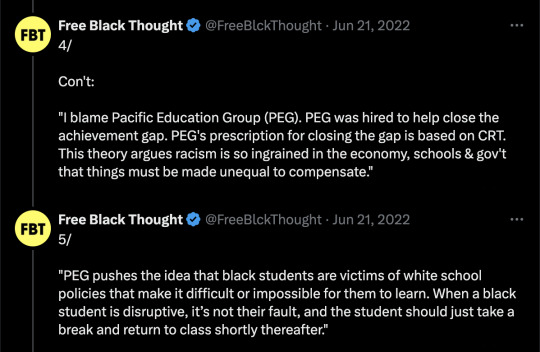
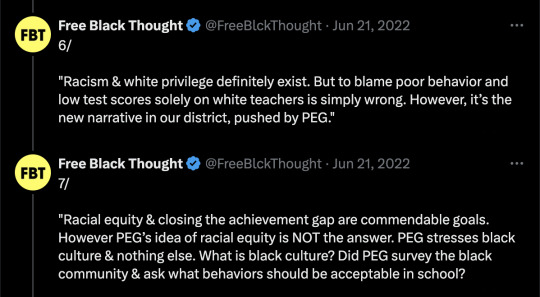
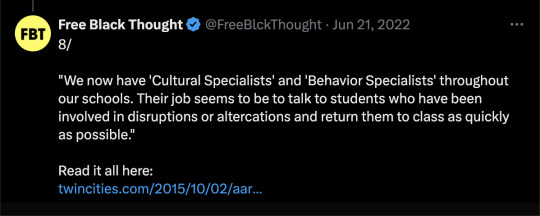
By: Aaron Benner
Published: Oct 2, 2015
I have been an elementary teacher almost all of my adult life, mostly in St. Paul Public Schools. First and foremost, I teach because I love kids, I love schools, I love our city, and I really love what happens when a group of kids becomes a community in a classroom and a school. For this to occur, everybody has to play a part — parents, students, teachers, building and district administration, and the broader community. As a black man, it breaks my heart to watch these communities fall apart and to see some children who look like me behave so poorly in our schools.
In 2011, I addressed the St. Paul School Board. At the time, I told them about my concerns with student behavior at Benjamin E. Mays Elementary School, where I taught sixth grade. I hoped to start a discussion about what I was witnessing. Although the media paid some attention (likely because my race made for an interesting story), the school board ignored me. I addressed the board again on May 20, 2014, regarding the same issues, but this time I was aware they were happening districtwide. Four other brave teachers accompanied me. The school board ignored us again and tried to paint us as anti-racial equity.
From 2013-15, I taught fourth grade at John A. Johnson Elementary (JAJ). The behaviors that I witnessed last year at JAJ were far worse than what I complained to the school board about in 2011 and in 2014. On a daily basis, I saw students cussing at their teachers, running out of class, yelling and screaming in the halls, and fighting. If I had a dollar for every time my class was interrupted by a student running into my room and yelling, I’d be a rich man. It was obvious to me that these behaviors were affecting learning, so when I saw the abysmal test scores this summer, I was not surprised. Out of 375 students, only 14.3 percent were proficient in Reading, 9.6 percent in Math and 9.3 percent in Science. These test scores are not acceptable in any way, shape or form.
I diligently collected data on the behaviors that I saw in our school and completed behavior referrals for the assaults. These referrals were not accurately collected. The school suspended some students, but many more assaults were ignored or questioned by administrators to the point where the assaults were not even documented. I have since learned that this tactic is widely used throughout the district to keep the numbers of referrals and suspensions low.
The parents who complained to the school board last year about behavior at Ramsey Jr. High know all too well about behaviors being ignored. The students of SPPS are being used in some sort of social experiment where they are not being held accountable for their behavior. This is only setting our children up to fail in the future, especially our black students. All of my students at JAJ were traumatized by what they experienced last year — even my black students. Safety was my number one concern, not teaching.
Who would conduct such an experiment on our kids? I blame the San Francisco-based consulting firm, Pacific Education Group (PEG). PEG was hired by SPPS in 2010 to help close the achievement gap. PEG makes no secret of the fact that its prescription for closing the gap is based on the Critical Race Theory. This theory argues that racism is so ingrained in the American way of life — its economy, schools, and government — that things must be made unequal in order to compensate for that racism. PEG pushes the idea that black students are victims of white school policies that make it difficult or impossible for them to learn. So, when a black student is disruptive, PEG, as I see it, stresses that it’s not their fault, and the student should just take a break, and then return to class shortly thereafter.
Racism and white privilege definitely exist, and there is not enough space in this paper for me to share all of the humiliating encounters I’ve experienced that are a product of racism. But to blame poor behavior and low test scores solely on white teachers is simply wrong. However, it’s the new narrative in our district, pushed by PEG.
I recently dropped out of the St. Paul School Board race to focus on my new job at a charter school, but I’m still concerned with the current state of SPPS and the direction of the school board. Here’s what I think should happen: First and foremost, the newly elected board must sever ties with Pacific Education Group. PEG has charged the taxpayers of St. Paul $3 million over the last five years. According to some reports, SPPS has matched PEG with $1.2 million. What are these matching dollars used for? It is crucial to understand that behaviors throughout the district have escalated to the point where we are at a crisis in St. Paul. PEG is not working. To add insult to injury, two weeks ago, the St. Paul School Board had the audacity to set the ceiling of next year’s tax levy 3.85 percent higher than the current year. Tax increase? This must be a joke.
Racial equity and closing the achievement gap, the correct way, are commendable goals. However, PEG’s idea of racial equity is NOT the answer. PEG stresses black culture and nothing else. What is black culture? Did PEG survey the black community of St. Paul and ask what behaviors should be acceptable in our schools? I don’t recall filling out any surveys or receiving any phone calls regarding this topic.
Because of PEG, we have forgotten about our Asian, Latino and Native communities. The St. Paul Public School district has the second most diverse school population in the country (New York City is ranked No. 1). For the record, Asians make up the largest minority group in our schools. PEG has influenced this district on major policy changes, from questionable behavioral guidelines and hiring practices to the creation of new positions with jargonistic titles.
We now have “Cultural Specialists” and “Behavior Specialists” throughout our schools. An overwhelming number of these specialists are black, and it’s not clear to me what their qualifications are. Their job seems to be to talk to students who have been involved in disruptions or altercations and return them to class as quickly as possible. Some of these “specialists” even reward disruptive students by taking them to the gym to play basketball (yes, you read that correctly). This scene plays out over and over for teachers throughout the school day. There is no limit to the number of times a disruptive student will be returned to your class. The behavior obviously has not changed, and some students have realized that their poor behavior has its benefits.
St. Paul Public Schools is in desperate need of true behaviorists to replace these “specialists.” Licensed therapists who are trained to help change and replace inappropriate behaviors. I expect that PEG would never go for this because it would contradict their excuse that “black culture” accounts for such behaviors. The newly elected school board can change that.
Another action the newly elected school board must take is to visit schools, listen to teachers, and offer them much-needed support. Teachers are currently fending for themselves when it comes to behavior concerns. Part of my frustration is with the leadership of the St. Paul Federation of Teachers. The union is so concerned with getting along with the district that they are paralyzed when the hundreds of teachers they represent bring up the issue of behavior. This needs to change.
PEG and SPPS are harming the very people whose interests they claim to represent. Follow the money. The taxpayers of St. Paul should demand to know who exactly is benefitting from PEG. Students definitely aren’t.
Aaron Anthony Benner works as the African- American Liaison/Behavior Coach and Community of Peace Academy, a public charter school in St. Paul.
--
By: Victor Skinner
Published: Sep 24, 2019
Aaron Benner, a black teacher from St. Paul, Minnesota, won a large settlement with the St. Paul School District last week over retaliation he faced for speaking out against the district’s race-based student discipline policies.
Benner argued the investigations came in retaliation for complaints to the school board about race-based student discipline policies implemented by then Superintendent Valeria Silva and promoted by President Obama. The discipline policies aimed to reduce suspensions of black students by lowering the expectations for behavior and increasing the threshold for suspensions, something Benner repeatedly, publicly argued was against the best interests of black students.
The “restorative justice” approach to student discipline was accompanied by “white privilege” teacher training sessions that cost the district taxpayers more than $3 million. Those sessions focused on the “white privilege” theory that the public education system is hopelessly stacked against black students, who shouldn’t be held accountable for poor academics or bad behavior.
In St. Paul and hundreds of schools across the country, the “white privilege” training sessions were conducted by Pacific Educational Group, also known as PEG.
“PEG was hired by SPPS in 2010 to help close the achievement gap. PEG makes no secret that its prescription for closing the gap is based on the Critical Race Theory. This theory argues that racism is so ingrained in the American way of life – its economy, schools, and government – that things must be made unequal in order to compensate for that racism,” Benner wrote in a 2015 editorial for the Press.
“Peg pushes the idea that black students are victims of white school policies that make it difficult or impossible for them to learn,” Benner wrote. “So, when a black student is disruptive, PEG, as I see it, stresses that it’s not their fault.”
Benner refused to accept that black students are less capable than their white classmates and left the school district in 2015. Benner taught at a local charter school and was later hired for a administration position at the St. Paul private school Cretin-Derham Hall, according to the Star Tribune.
After years of complaints from parents, teachers, administrators and others about violent and disruptive students running rampant with impunity, St. Paul school leaders eventually got rid of Silva and scrapped the failed student discipline policies.
Last week, the school board settled up with Benner, though the district denied any wrongdoing.
“This agreement enables the district to avoid the time, expense and uncertainty of protracted legal proceedings regarding its previous policies, practices and expectations,” board members wrote in a prepared statement.
The district contends taxpayers are responsible for $50,000 of the settlement, while its insurer will cover $475,000.
Benner told the Star Tribune he credits God for the favorable outcome.
“I thank God for all the blessings in my life,” he wrote in an email to the news site. “I turned 50 this year, got married in July and now (there is) this settlement.”
#Aaron Benner#diversity equity and inclusion#diversity#equity#inclusion#racial equity#white privilege#diversity training#educational equity#lower standards#bigotry of low expectations#neoracism#antiracism as religion#antiracism#racial discrimination#corruption of education#education#religion is a mental illness
38 notes
·
View notes
Note
Casually waiting for the ineviteable "I'm a doctor, not a...." -comments/lines to start appearing in your fics...
Go ahead... We can wait...*checks watch*
Lmaooooo I'm ngl I've already thrown out "I went to school for medicine, not geography" a time or two in the past week or so to excuse the fact that I grew up in the Bay Area bubble and don't know where the fuck Montana is. The trouble with fic in particular is that I have a tendency to try to research the shit out of something if I at least know enough about it to realize that I don't know enough to portray it accurately, so my fics at least are going to have as much accurate information as possible.
But if you're talking to me in real time then you can bet I'm gonna bank on "I'm a doctor, not a historian." :'))))
#ask#personal#Anonymous#tbf to get as far as “doctor” I've had to have a pretty thorough general education#especially since I went to a liberal arts school for undergrad#so I'm actually generally pretty well-rounded by the standards of the average person#I think the main things I know jack shit about are business/finance and certain religions (cough Christianity cough)#thankfully I know people I can ask in-depth questions about both ehehe
23 notes
·
View notes
Text
In Houston this year, 28 schools have had their libraries removed and replaced with ‘disciplinary centers’. So sure, as if most students don’t view school as a kind of prison already, this will help that along. We have a big problem with education in this country. Most schools are forced to teach students to be able to pass standardized tests, because if they don’t, the school will lose funding. By forcing kids to all learn the same stuff regardless of their personal interests, schooling becomes a chore, something to be avoided, and the moment they stop being forced to learn, they WILL stop. This is how you create a permanent uneducated underclass, which is why dark political forces that thrive in ignorance are doing everything they can to ruin education. Like in Houston.
126 notes
·
View notes
Text
i’m sure this has been said before and much more concisely but the whole parasocial relationship that audiences have with creators has only perversely grown in the sphere of literature. i see the most examples on places like tiktok and yours truly, tumblr, but it’s cropping up everywhere now. comments like “x author TOTALLY didn’t understand y character—they should have totally did this instead”. there’s a huge difference between an author mixing up/not fully fleshing out plots but to have this strange sort of hubris to suppose you know an author’s character better than said author is just inane interesting. this also extends to the very not new but never endingly exhausting theme of “why would author EVER write this like ugh i almost stopped reading here” okay bethany why didn’t u. it’s not every single authors job to cater to ur interests. not everything u read is supposed to be making a morally sound point, certainly not supposed to meet your personal version of one. literature is art, is subjective, is open and unrestrained. it’s not “oh my god this character is soooo toxic why is the author gaslighting us and omg there isn’t enough sPiCe” like grow up and learn critical thinking god
#can u tell i hate booktok with a burning passion#i will be the first to admit i have contributed to this mindset at one point and i am actively trying to get better and educate myself more#literature is not supposed to uphold arbitrary moral standards!! let creators fucking create!!#we all suffer when we start assigning what’s allowed and what’s not allowed to appear in literature#you don’t have to agree or like something shown but that doesn’t mean it must now be censored because u personally are put off#booktok#writing#aftg#the secret history#red white royal blue#all for the game#the raven cycle#the song of achilles#one last stop#the sandman#good omens#captive prince
807 notes
·
View notes
Text




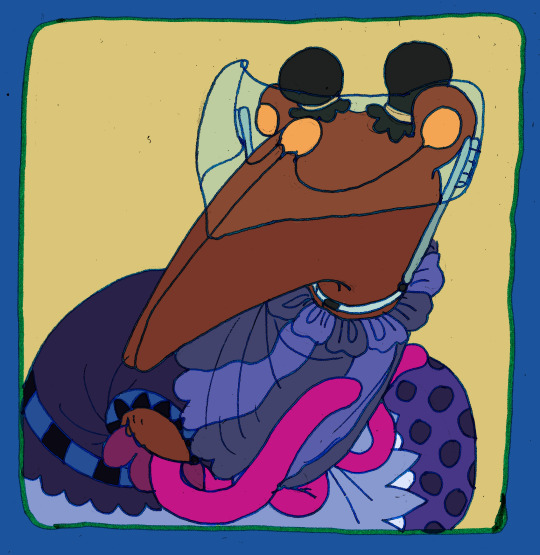

loppits who live onboard the same ship rrikrik works on
their names and jobs are are (top to botton, left to right) sister swii-qui and sister uuuii, students on a work experience apprenticeship position, little yui, a mechanic specializing in "biobotics" - machinery using biological function as opposed to electricity to run, big yui, the main doctor and biological scientist onboard, and finally gwii, an electronic coder.
i also drew big yui's entire body, because i was trying to think how the large loppits would move and interact with the world around them.
#oc#xenobiology#speculative biology#alien species#worldbuilding#loppit tag#im really happy and grateful for the love that loppits have gotten! i wasnt expecting it!#im still not so sure about using english feminine terminology for loppits...#its hard in general to write stories about aliens when you have english#because english uses gender is such a way. at least it isnt worst case scenario language for such a situation#so i think it could be useful to use english gendered grammatic structures to convey an alliance or a similarity to english gendered#expression. for example i think im gonna use she/her and feminine terms for sadum cows for now on and he/him and masculine terms for hounds#not because sadums reproduce like humans or have reproductive or social categories of “male” and “female”#but more because sadum society's use of gender based oppression and sex exploitation is similar to patriarchy for humans#but then that terminology wouldnt make sense for ki despite them also having gender based oppression#because ki society is much more complex in how they structure both sex and gender#while sadum society is generally binary much like how patriarchy is binary#anyway in this example i use “sister” less in a gender way and more in a religious way#because the educational establishment that swii-qui and uuuii come from is a religious one and theyre like nuns#theyre very sheltered and priviliged and also very annoying about things but theyre just learning#like they try and tease little yui for being an industrial worker and l yui gets really sensitive about it cus theyre a sensitive person#and then they try and tease big yui too but big yui takes no shit and shuts them down and they gain an appreciation of them because of it#OH YEAH. the little pink section of skin that is open on swii-qui and uuuii's faces is not a mouth!#it is like a VNO like dogs and cats have on the roof of their mouths but for sound#they eat thru the weird slit they have on their “chests” and they breathe thru their tail bumps#oh yeah ONE MORE THING#uuuii and swii-qui are both very flashy alt fashion fans and so their outfits are very weird for loppit standards
17 notes
·
View notes
Text

title card for a pliot of a hypothetical weird al cartoon
he's gone back to his underground cave for another round at entertaining the masses, but there's one big problem - there's a LOT of things poor ol' Al left behind. will he get everything cleaned up before trash day ends, or will he be stuck in clutter forever?
#weird al#digital art#ibispaintx#fake screenshot#winter.png#yes that's an imitation of the riquse font. i think it looks nice#also. this show isn't bound by the educational standards of the first weird al show#partially because the creative director here is good ol' gabriel hunt (<- says this as if i haven’t only talked to one person abt him)#the other weird al show#<- official name for this show now
42 notes
·
View notes
Text
I feel like denying your whiteness is not only denying ur own I dentity which sucks, but also denying ur privileges? There’s no shame in having privileges bc of ur ethnicity bc it’s nothing you can control, what you can do is admit to it and be normal about it??? The whole “I’m not white I’m actually 2% norweigan” is not helping anyone
#I have a bunch of privileges as well being relatively white passing or at least fitting a Eurocentric beauty standard#being one of the ‘good’ poc#n just in general living in a first world country with university educated parents#so I’m not denying that I have any or saying I’m the one who can point out whose a ‘REAL’ victim or not#just my take on it
26 notes
·
View notes
Text
i guess my thing about adhd is that the point of school* is to put kids through a lot of misery and force them to do a lot of purposeless tasks and the ones who succeed in this context by following orders to the letter without question and completing meaningless tasks without complaint get rewarded, and the ones who don't succeed at it get labeled "bad at school" and sent to a hell dimension forever. and the argument of adhd is "this specific subgroup of the people who are bad at school actually don't deserve to be sent to the hell dimension forever, because their parents can afford psychiatrists. obviously people who are bad at school need to go to the hell dimension but these specific children are actually SECRETLY not bad at school, they just have something with their brains that makes them appear bad (which is so different from all the other children who are bad at school due to their poor moral character or low intelligence, traits which famously have nothing to do with the brain and how it works)." and you can say "oh maybe specific subgroups of those children also don't deserve to be sent to the hell dimension because they also have something wrong with their brains" but in the end it's like. all you are doing is arguing that certain people should be lifted out of the hell dimension through grace, you're not actually arguing that no one should be sent to the hell dimension. you're just arguing that a different sent of people should be sent there, because the point of school is to separate the winners from the losers, and you can't actually increase the number of winners or decrease the number of losers, you can only change who they are.
*also true of work to a certain extent, particularly in certain fields, but especially true of school.
#did you know that education and nutrition have increased so much in the last seventy years that if you administered modern testing#to a group of people from the forties like a quarter of them would be considered intellectually disabled?#and yet somehow. the percentage of the population considered intellectually disabled has not actually changed. because the expectations#are not linked to any objective marker but to average performance#it was never about specific standards it's about separating people into winners and losers. and the identities of the winners and losers#can change. but their numbers cannot.
112 notes
·
View notes
Text
as someone who had to learn phonetics and ipa during acting class i LOVE whenever phil talks about his education
#educate the masses about where sounds are placed!!#tell the girls about fricatives and plosives!!#teach about diphthongs and triphthongs#petition for phil to talk about his education more bc i’m so intrigued#me learning to write my name in the phonetic alphabet#if ur curious i had to learn how to speak without any regional indicators and then learn three dialects using ipa as a guide#we learned american southern and standard english and irish#i sucked at irish btw#sorry to my ancestors#dan and phil#phil lester
21 notes
·
View notes